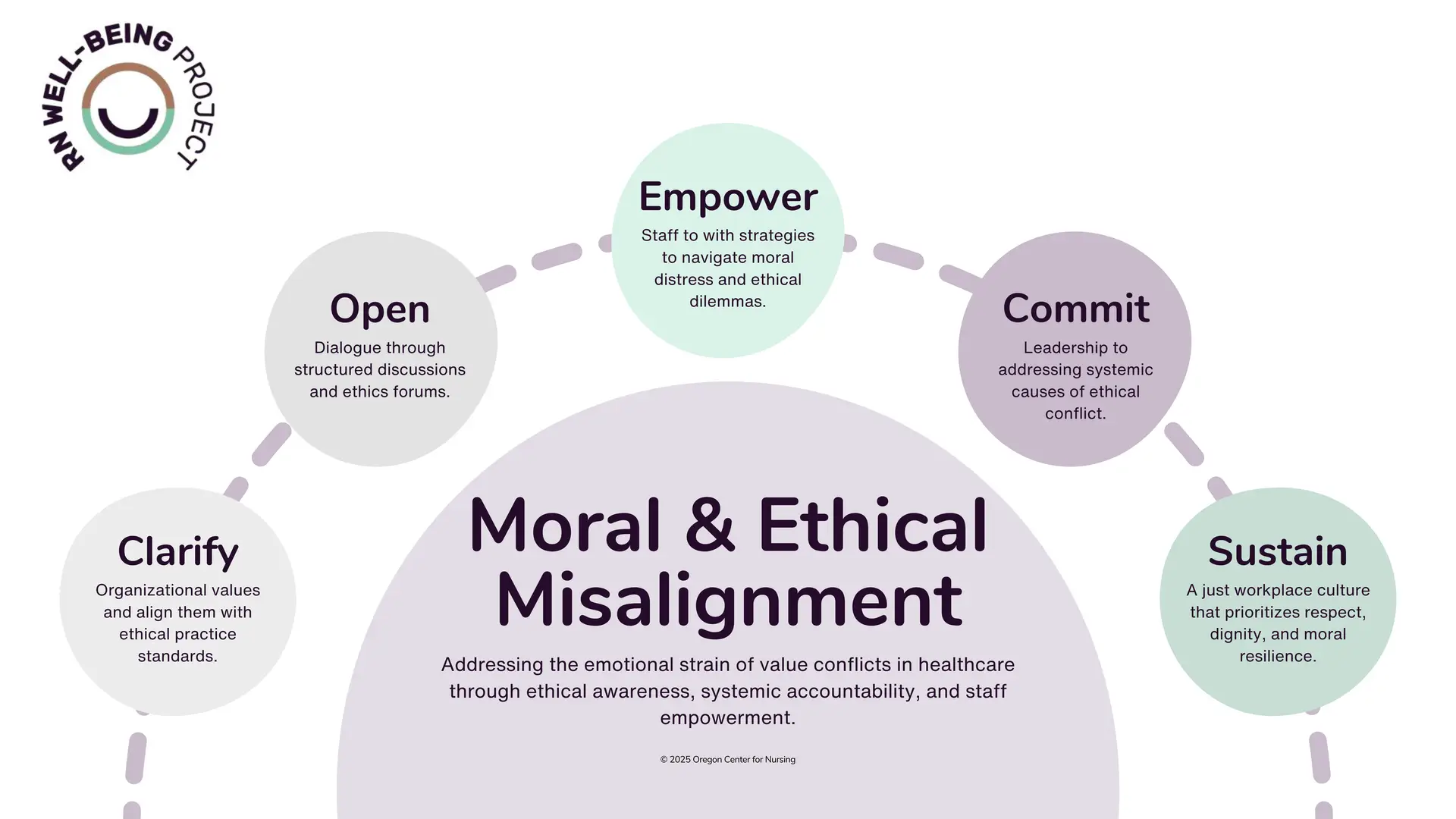Manageable Stressor: Moral and Ethical Misalignment
The strain of value conflicts in healthcare.
Nurses enter their field with a strong sense of purpose, guided by ethical principles and a commitment to quality patient care. However, real-world constraints—such as institutional policies, resource limitations, and conflicting values—can create moral and ethical misalignment. When personal and professional ethics clash with workplace demands, it can lead to moral distress, emotional exhaustion, and disengagement from patient care [1-5].
What Is Moral & Ethical Misalignment?
Moral and ethical misalignment occurs when a healthcare provider’s ethical beliefs conflict with the realities of their work environment [1-5]. These conflicts may arise due to:
- Systemic barriers that prevent professionals from providing the best care [1, 3, 5].
- Conflicts with institutional policies or leadership decisions [1, 4, 5].
- Patient choices that contradict medical recommendations [1, 3-5].
While some moral stress is expected in healthcare, repeated or unresolved conflicts can lead to frustration, guilt, and professional disengagement [1-5].
Recognizing Moral & Ethical Misalignment
Moral and ethical misalignment can be difficult to detect, as professionals may suppress or rationalize their distress to continue functioning in the workplace [1, 3-5]. Employers should be mindful of:
- Workplace Signs: Decreased morale, reluctance to follow institutional policies, ethical complaints [1, 3, 5].
- Behavioral Changes: Withdrawal, frustration with leadership, disengagement from decision-making [1-5].
- Emotional Shifts: Guilt, anger, helplessness, loss of professional satisfaction [1, 3-5].
- Physical Symptoms: Increased stress responses, fatigue, and sleep disturbances [1-3, 5].
Recognizing these patterns early can help prevent long-term distress and workforce attrition [1, 3-5].
Preventing & Addressing Moral & Ethical Misalignment
Organizations can reduce moral and ethical misalignment by ensuring staff feel heard, supported, and ethically empowered [1, 3-5].
By embedding moral and ethical alignment into workplace culture and policies, organizations can help professionals reduce moral distress, maintain job satisfaction, and sustain compassionate patient care [1, 3-5].
Preventing Moral & Ethical Misalignment
- Ethics Training & Discussion Forums: Provide regular education on ethical dilemmas and structured discussions to address moral concerns [1-3, 5].
- Open Communication Channels: Establish structured opportunities for staff to voice ethical concerns and seek guidance [1, 3-5].
- Leadership Accountability: Ensure management is proactive in addressing systemic ethical conflicts and supporting ethical decision-making [1-3, 5].
- Clear Ethical Guidelines: Align institutional policies with professional ethical standards to reduce ambiguity in decision-making [1, 3-5].
- Values-Based Decision-Making Frameworks: Implement structured ethical decision-making tools to help staff navigate moral dilemmas [1, 5].
Supporting Affected Staff
- Ethics Committees & Advisory Support: Offer access to structured ethical decision-making resources and advisory teams [1, 2, 5].
- Advocacy & Peer Support Networks: Encourage shared problem-solving, team discussions, and collective moral resilience efforts [1, 3-5].
- Debriefing & Reflective Practices: Normalize ethical debriefing and reflective supervision to help staff process moral stress [1, 2, 5].
- Well-Being & Stress Management Initiatives: Provide stress management resources and training to support emotional resilience in ethical decision-making [1-4].
- Commitment to Workplace Integrity: Foster a culture where ethical integrity and professional values are openly discussed and prioritized [1, 3, 5].
References
[1] Paiva-Salisbury, M. L., & Schwanz, K. A. (2022). Building Compassion Fatigue Resilience: Awareness, Prevention, and Intervention for Pre-Professionals and Current Practitioners. Journal of Health Service Psychology, 48(1), 39–46. https://doi.org/10.1007/s42843-022-00054-9
[2] Papazoglou, K., Blumberg, D. M., Collins, P. I., Schlosser, M. D., & Bonanno, G. A. (2020). Moral injury in police work: Exploring resilience and moral stress. Journal of Police and Criminal Psychology, 35(4), 289–297. https://doi.org/10.1007/s11896-020-09375-y
[3] Rushton, C. H., & Stutzer, K. (2021). Transforming moral distress into moral resilience in nursing. American Journal of Nursing, 121(2), 66–72. https://doi.org/10.1097/01.NAJ.0000737293.17455.69
[4] Smout, S., Lobb, E., & Good, P. (2022). Ethical distress in palliative care: An exploration of healthcare workers’ experiences. Palliative Medicine, 36(7), 1054–1062. https://doi.org/10.1177/02692163221098263
[5] Harrison, K. L., Dzeng, E., Ritchie, C. S., & DeCamp, M. (2021). Addressing moral distress in palliative care: The role of communication and policy. Journal of Palliative Medicine, 24(9), 1300–1308. https://doi.org/10.1089/jpm.2020.0595


